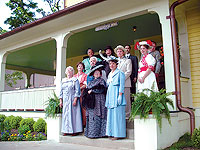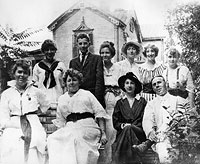“I will kill you, House,” he gasped. “Vile and accursed House, I will tear you down. I will bring you down upon the whores and boarders. I will wreck you, House … I will make you fall down on all the people in you, House,” he said.
— Thomas Wolfe, Look Homeward, Angel
Forget everything you may have heard from the historical and literary boosters around town: Thomas Wolfe hated it here.
Asheville at the turn of the 20th century was too small for Wolfe — too closed in — and the place was filled with people who were more caricature than real. Wolfe’s first novel, Look Homeward, Angel, is largely about his eventual escape from the town, rather than any embracing of it.

Right next door to riffraff: Julia Wolfe’s “Old Kentucky Home” wasn’t exactly a flophouse, but it was close. For the 90th anniversary of the house’s heyday as depicted in Look Homeward, Angel, local actors, above, will portray some of the house’s real boarders, seen below in a vintage photo with a young Thomas Wolfe among them.
|
At the center of this hell were the occupants of The Old Kentucky Home, Wolfe’s mother Julia’s boarding house, memorialized in Angel as “The Dixieland.” Wolfe spent his childhood in petty service to these strangers, a myriad of lower-rung boarders, tourists and travelers. It was the house that split his family — his father loathing the place enough to move out altogether — and it would ultimately hold the bed his beloved brother Ben would die on.

Provided courtesy of Thomas Wolfe Memorial
|
It’s ironic, then, that the things Wolfe hated about the place are the same things literature fans love. What Wolfe endured as an irritating, overpopulated and ever-changing mass of faces, needs and quirks, they honor as the stuff of life captured forever in the amber of the writer’s words.
But words aren’t always enough. Some want to see what Wolfe saw, smell what he smelled. They want to reach out and shake hands with the past, feel the grip of history.
“[On our tours] we talk about Wolfe’s unfolding childhood, and his meeting diverse individuals who would ultimately shape many of the more colorful characters in his novels,” says Chris Morton, Historic Site Interpreter at downtown’s Thomas Wolfe Memorial (which comprises a visitors’ center and the adjacent, recently restored Old Kentucky Home). “The concept of the living-history program was to take that one step further and actually people the house with [actors] who represented some of those individuals, and to bring the house to life for one weekend.”
During “A Day in May, 1916,” to be held Saturday and Sunday, visitors will encounter a variety of characters — including a baseball player with the Charlotte Hornets, a traveling shoe salesman with a lingering cough, an overworked cook, and a circus performer.
There’s even a young, single woman who just might be accepting money for illicit services.
“Boarding houses of the caliber that Mrs. Wolfe ran often walked a fine line between being a respectable establishment and a legalized brothel,” says Morton. “There were elements of riffraff that sometimes infiltrated the lower-ranked boarding houses. This wasn’t a flophouse, but it wasn’t a select boarding house, either. This year, we decided to incorporate a woman of dubious morality, who is single and dressed in a more flamboyant style. Mrs. Wolfe would be very suspicious of her.”
Fortunately for the boarders, Mrs. Wolfe is conveniently absent during “A Day in May,” allowing them to talk a bit more freely about the family. In fact, nowhere in the house will you find a single Wolfe — they’re always off somewhere else.
“It’s a self-imposed restriction,” explains Morton. “We don’t portray the family, but they’re always spoken of.”
And there’s a lot to talk about. In May 1916 — 90 years ago, as it happens — Thomas Wolfe was nearly on his way to college, a source of furious arguments between his parents. His sister Mabel was only a few months away from getting married, and his brother Ben was attempting to enlist in the Canadian Army for the war in Europe.
In addition to knowing the gossip of the Wolfe family, the actors also need to be well versed in the current events of the Wilson administration. Women’s Suffrage, Pancho Villa’s raids and the potential for a prohibition on alcohol, for instance, would almost certainly have been on the minds of Mrs. Wolfe’s boarders.
“You want them to feel that they’ve really stepped into 1916,” says actress Jackie Gorman, who plays a retired school teacher based on her own mother. “We often talk about the war in Europe. President Wilson’s been saying that he won’t let it come to this country. But, presidents say that kind of thing.”
Gorman says visitors also get a kick out of trying to slip the actors up, hoping they’ll stumble into anachronisms.
“Somebody once asked me if I could drive,” she recalls. “I told them that we had a good team [of horses] that behaved well. It’s been easy for me, because my mother told me a whole lot about her teaching days. The rest of it you have to make up on the spur of the moment.”
But it’s not just the actors who get to play time-traveler. Visitors receive a business card for the House bearing the name of an actual boarder who stayed there, an idea inspired by the Holocaust Museum in D.C.
“We try to build in props when we can,” says Morton. “We don’t know a whole lot about the individual lives of the people who stayed here, but visitors can introduce themselves to our actors as that person if they choose to. These little tidbits add a dimension of reality for just a brief moment, and it’s a way to further immerse visitors into the experience.”
Despite (or perhaps because of) Wolfe’s anguished memories of the place, “this house was indelibly stamped in [his] memory,” says Morton. “He had a turbulent childhood, and he was living in an unsettled situation where he couldn’t even claim a room as his own.
“That’s Look Homeward, Angel. And that’s also adolescence … the search for your identity — who you are and who you want to be.”
The Thomas Wolfe Memorial (52 N. Market St.) holds “A Day in May, 1916” 1-4 p.m. on Saturday, May 13 and Sunday, May 14. $6. 253-8304.



Before you comment
The comments section is here to provide a platform for civil dialogue on the issues we face together as a local community. Xpress is committed to offering this platform for all voices, but when the tone of the discussion gets nasty or strays off topic, we believe many people choose not to participate. Xpress editors are determined to moderate comments to ensure a constructive interchange is maintained. All comments judged not to be in keeping with the spirit of civil discourse will be removed and repeat violators will be banned. See here for our terms of service. Thank you for being part of this effort to promote respectful discussion.